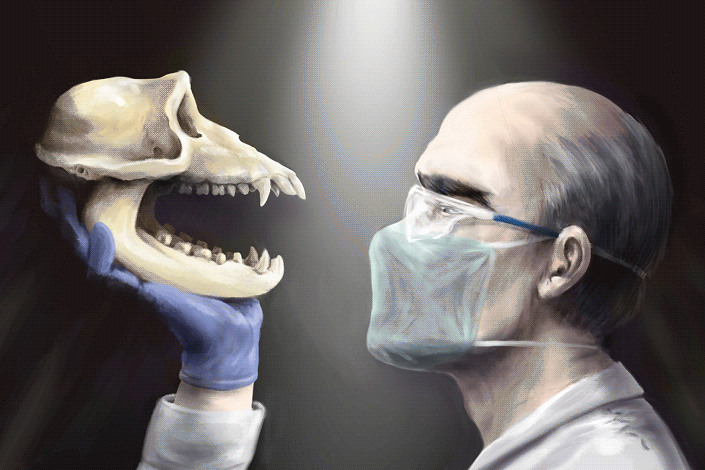Study: Low testosterone levels could lead to periodontal disease in men

Image: Academic Affairs Communications, Research Communications and Public Relations
More than 20 species of macaques, the most widely distributed nonhuman primates in the world, socialize in lively troops and make frequent appearances on National Geographic documentaries. But, what can we learn from one of our closest primate relatives about our own oral health?
Quite a bit, according to findings from a retrospective study done by researchers at the Texas A&M University Baylor College of Dentistry. Their work, which was recently published in the American Journal of Physical Anthropology, indicates that a lack of testosterone left these monkeys with periodontal disease.
Qian Wang, associate professor, and Paul Dechow, Regents Professor and department chair, both in the Department of Biomedical Sciences, analyzed the skeletonized remains of five castrated male rhesus macaques, all of which had died of natural causes. Their mandibles, or jawbones, remained intact, offering the opportunity for comparison with remains of non-castrated males of approximately the same age. The differences were telling, and obvious; many of these traits can be seen with the naked eye.
All of the castrated males showed signs of periodontitis and other oral problems that were much more evident and severe than in intact males of the same age. In particular, the researchers noted that the bone that supports teeth had dramatically receded on the two 26-year old geriatric castrated males.
This pattern with the rhesus macaque has relevance for oral health in adult males.
This study is unique because, while the link between estrogen, oral health and the temporomandibular joint is well known, the correlation between male sex hormones and oral health is not as widely publicized.
“We do know that many craniofacial tissues are sensitive to sex hormones,” Dechow said. “It’s just that it was usually more thought of on the estrogen side.” Although of course these relationships require further study, “they do raise the possibility that these may be important factors in the health of the craniofacial tissues, especially in aging.”
Even less extreme forms of testosterone loss may have an impact.
The U.S. Food and Drug Administration says the use of prescription testosterone replacement therapy increased from 1.3 million patients in 2009 to 2.3 million patients in 2013.
As diagnoses for low testosterone become increasingly common, dentists may want to consider asking about this therapy when documenting their male patients’ health histories.
“This way, the dentist may have a better picture of the overall well-being of the patient,” said Wang, lead author on the study. “Low sex hormones are a natural phase of aging, and oral health could be a collateral victim, which is why oral hygiene and routine checkups are important throughout life.”
More from the Texas A&M Baylor College of Dentistry

